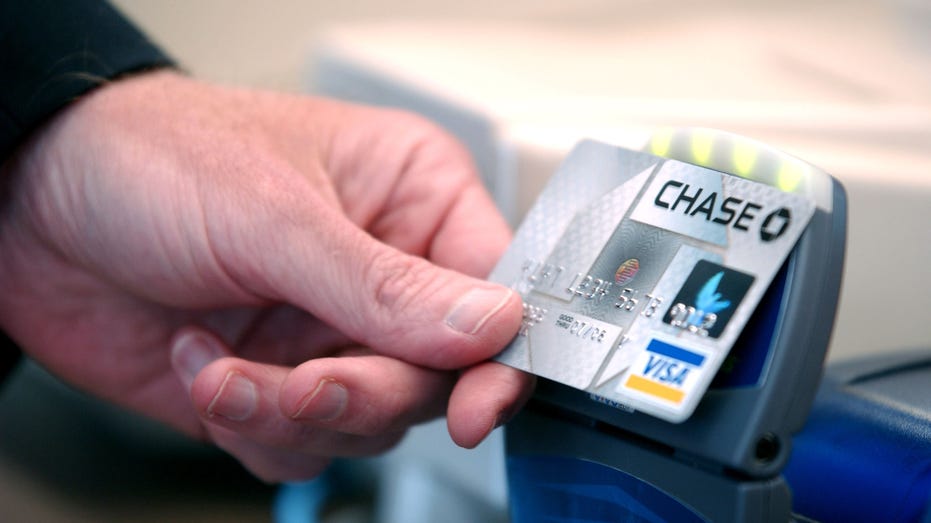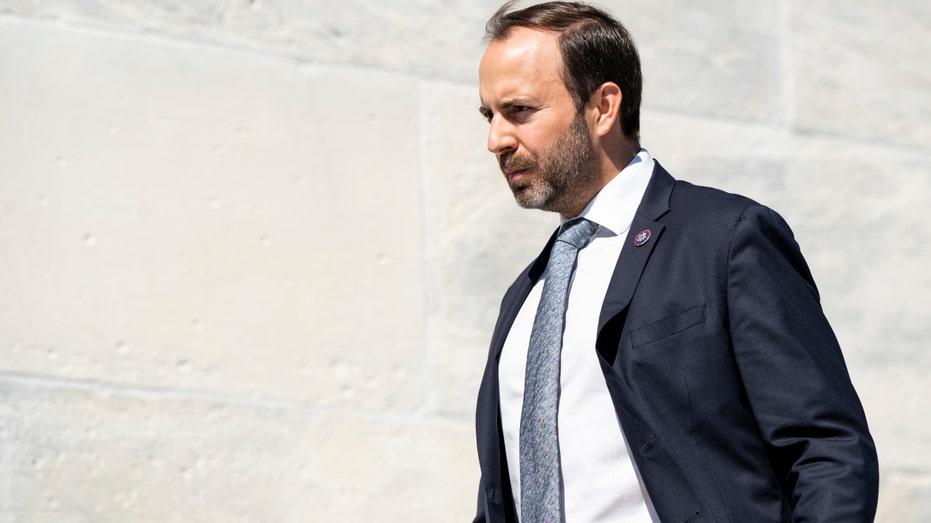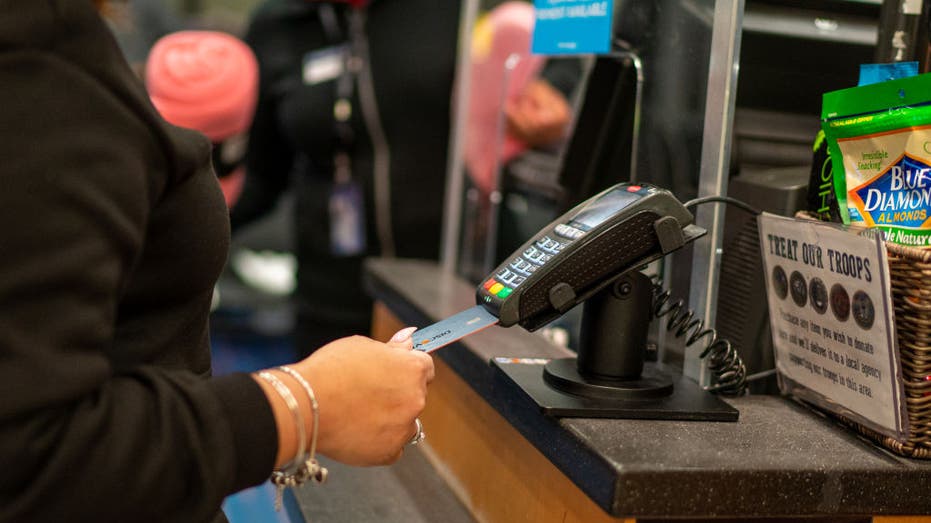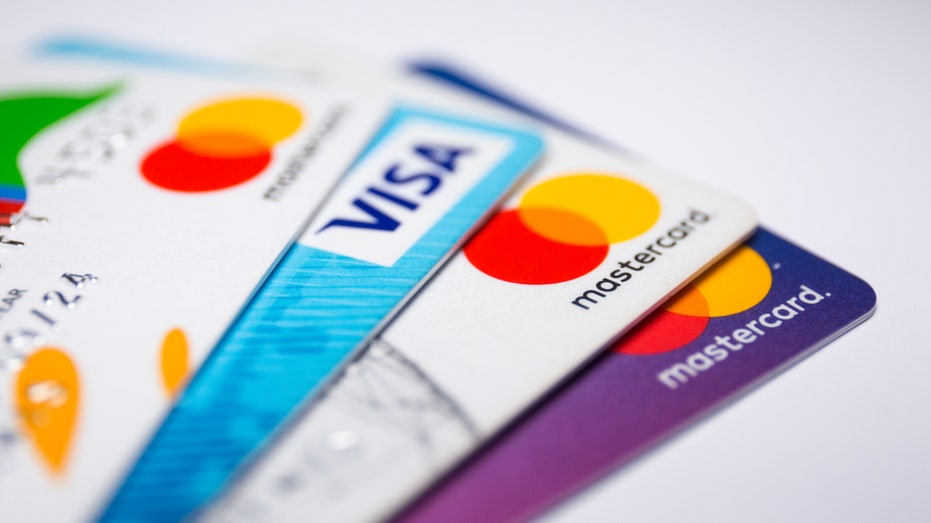New credit card bill targeting Visa-Master card 'duopoly' triggers lobbying onslaught
Rep. Lance Gooden says Big Bank campaign to kill credit card legislation pushing 'misinformation'
Credit cards have become the 'cigarette' of the financial world: George Kamel
'The Ramsey Show' co-host George Kamel discusses the drop in retail sales and consumer spending, and reacts to Marie Osmond not granting her children an inheritance.
A bipartisan group of lawmakers led by Rep. Lance Gooden, R-Texas, is pushing legislation that would significantly reform the credit card industry with the purpose of fostering greater competition, prompting widespread outcry from a diverse coalition of banks, credit unions and advocacy groups.
Gooden on Wednesday introduced the Credit Card Competition Act, which would require large banks and other credit card issuers with over $100 billion in assets to offer at least two network choices to process and facilitate transactions, at least one of which must not be owned by Visa or Mastercard. Republican Reps. Jeff Van Drew of New Jersey and Tom Tiffany of Wisconsin, along with Democrat Rep. Zoe Lofgren of California, joined Gooden as original co-sponsors.
The Senate also unveiled its own version of the bill in bipartisan fashion on the same day. Sen. Roger Marshall, R-Kansas, introduced the legislation along with fellow Republican Sen. J.D. Vance of Ohio and Democrat Sens. Dick Durbin of Illinois and Peter Welch of Vermont.
A credit card network facilitates transactions between merchants and the financial institutions that issue credit cards. These networks charge merchants an interchange fee for processing a consumer's transaction.
Currently, Visa and Mastercard control an estimated 85% of the U.S. credit card market, handling the vast majority of credit card transactions with cards issued on their networks. Meanwhile, JP Morgan Chase, Citibank, Bank of America, Capital One, Discover and American Express control roughly two-thirds of outstanding balances as card issuers who manage credit.

Chase Bank credit card with "blink" technology is displayed during a press conference at an Arby's restaurant on June 8, 2005, in Denver. (Thomas Cooper/Getty Images)
CREDIT CARD DEBT SET TO HIT $1T AS CHRONIC INFLATION CRUSHES AMERICANS
Proponents say the purpose of Gooden's bill is to create competition and level the playing field to challenge what they describe as the Visa-Mastercard "duopoly" as well as the dominance of Wall Street when it comes to credit cards.
However, the bill has prompted what observers on Capitol Hill have described as a particularly intense lobbying offensive to oppose the legislation, with critics calling the measure "anti-free market" by allegedly imposing price controls and serving big business interests.
According to Gooden, such claims are fueled by "misinformation" and meant to change the narrative and protect major banks rather than small businesses and the average consumer.
"The misinformation campaign led by special interests representing the credit card duopoly and the $23.6 trillion banking industry should be a red flag to lawmakers," Gooden told Fox News Digital. "It's clear these credit card behemoths have no interest in debating this bill on merit or giving small businesses a fighting chance. The choice here is clear: Wall Street or Main Street? I will continue to fight for my constituents and small businesses across America."
However, critics who oppose the bill and favor the current system argue that large retailers would be the ones to benefit the most.
"Despite vigorous lobbying from Walmart and Target, this 'Big-box Bill' was deeply unpopular legislation when it was previously introduced last year – among both Democrats and Republicans," said Aaron Stetter, executive director of the Electronic Payments Coalition. "This legislation would hurt consumers by increasing costs, weakening payment security, harming small financial institutions, reducing access to credit for those who need it the most, and ending popular credit card rewards programs."

Rep. Lance Gooden walks down the House steps on Sept. 24, 2021. (Bill Clark/CQ-Roll Call, Inc via Getty Images)
HOW CREDIT CARD SWIPE FEES ARE HITTING CONSUMERS
Stetter's position echoes the sentiments of a major multimedia ad campaign launched in December by the American Bankers Association (ABA) to oppose the Credit Card Competition Act. ABA President and CEO Rob Nichols described the bill as "anti-consumer legislation that would reduce choice, jeopardize consumer data security, and eliminate travel points and other popular credit card rewards programs," arguing "mega-retailers" are behind the legislation to "pad their profits." According to the ABA's television ad, the bill is a "new costly mandate" under which "consumers and Main Street will lose big."
The nation's biggest small business lobby, the National Federation of Independent Business, has endorsed the Credit Card Competition Act, as have various industry groups.
"The Credit Card Competition Act is a beacon of hope for main street businesses like restaurants," said Emily Williams Knight, president and CEO of the Texas Restaurant Association. "Two credit card companies control over 80% of the market, and predictably their fees have more than doubled in the past decade. For the local restaurant, this is a David versus Goliath story they live every day, forcing lower margins and higher prices that multiply inflation for consumers. By empowering restaurants and other main street businesses to choose a secure network to route credit card transactions, the Credit Card Competition Act restores some balance to the scales and stands to save main street businesses and consumers an estimated $11 billion a year."
Interchange fees are one of the central issues to the debate over the legislation. Every time a consumer pays with a credit card, the merchant pays an interchange or "swipe" fee ranging from about 1.5% to 3.5% of every transaction to the network that processes the payment. While the fees don't show up on consumers' receipts, merchants may raise the prices of their goods or services to help offset the added cost.
Last year, merchants were charged $126.4 billion in credit card swipe fees, which was 20% higher than what they paid in 2021. According to the Merchants Payments Coalition, this means the average family had to shell out an additional $1,024 on items due to higher credit and debit card swipe fees even before inflation. Supporters of Gooden's bill argue adding a second competitive network to a card to potentially charge lower fees could save retailers and their customers at least $11 billion per year.

A traveler uses a credit card to pay for items on Jan. 28, 2022, at a retail shop in John F. Kennedy International Airport in New York City. (Robert Nickelsberg/Getty Images)
"Due to a lack of competition, credit card companies have been able to exponentially increase hidden processing fees over the last decade," said Leslie Sarasin, president and CEO of the Food Industry Association. "These fees are most retailers' highest business expense after labor and rent. By requiring more than one network option on credit cards, the Credit Card Competition Act would foster competition and transparency in the credit card market so that card networks would have to compete for business on fees and terms – just as we compete for our customers' business."
Opponents counter that interchange fees fund a host of essential benefits and claim that the legislation would actually end up hurting consumers while helping large retailers.
"Interchange fees directly fund transaction security and innovation as well as consumer rewards programs, features highly valued by consumers," dozens of community and other banking associations wrote to congressional leaders in a letter opposing the bill. "Allowing merchants to control network routing regardless of the issuing bank or consumers preference will translate into larger and more frequent security breaches, higher incidence of consumer fraud, as well as diminished or eliminated consumer rewards programs. Rewards programs have been valued by consumers for over a generation, from cash-back programs to airline miles to points toward purchases at favored merchants."
The Credit Union National Association has echoed this message as part of its lobbying campaign, as have a host of banking and credit union groups similarly opposed to the bill.
Gooden and supporters of the bill argue that card rewards programs come from banks, not the networks, and will be offered as a marketing tool regardless of whether there's competition with swipe fees. They also note that the U.S. currently has the world's most credit card fraud at about 35%, despite being the most expensive market for routing credit cards transactions and reportedly only accounting for 22% of the world's transaction data.
The bill specifically flags networks owned, funded or sponsored by foreign state entities such as China from processing U.S. credit card transactions, and proponents argue a secondary network able to handle transactions will help with security in the event that Visa or Mastercard experiences a cyber-attack.

In this photo illustration, a Visa credit card and Mastercard debit cards are displayed. (Karol Serewis/SOPA Images/LightRocket via Getty Images)
CREDIT CARD FRAUD ALERT? HERE’S HOW CROOKS SWIPE YOUR PAYMENT CARD DETAILS
Still, a variety of advocacy groups as well as banking associations and credit unions have described the legislation as a "backdoor price control" that would create a government-mandated system.
"This is textbook rent seeking behavior, anathema to free market principles, and should be staunchly opposed by Republican lawmakers," several advocacy groups wrote in a letter to members of Congress. "The bill does not promote competition, instead it dramatically expands the role of the federal government to overregulate the market for credit cards."
Gooden responded to such claims in a letter to Texas community banks, arguing the current system is anything but a free market with competition.
"The current system allows a duopoly of payment networks in conjunction with the largest banks to dominate 85% of the market, control interchange fees, suppress consumer choice, and crush any competition," he wrote. "It is blatant hypocrisy for the Big Banks to claim this legislation is anti-free market but at the same time criticize the bill for giving consumers and merchants greater choice in payment networks."
On the Senate side, Marshall pushed back against the notion that the legislation is an example of big government, emphasizing that the point is to foster competition in order to help consumers and small businesses.
"Main Street is struggling," Marshall told Fox News Digital. "While shouldering the burden of inflation, small businesses like our local grocery stores, gas stations, and convenience stores are weathering the economic storm on two fronts. On the one hand, they are fighting to keep their prices low, understanding that Americans are struggling with the increased cost of living, and on the other hand, the wolves on Wall Street and the Mastercard and Visa duopoly are price gouging them at every turn with increased ‘swipe fees.' Our legislation puts American consumers back in the driver’s seat by injecting more competition into the payment processing industry-leveling the playing field. Competition is always a good thing."
CLICK HERE TO GET THE FOX NEWS APP
Many of the banks and advocacy groups against the Credit Card Competition Act also say the bill, if implemented, could require the reissuance of millions of credit cards and chip recertification – an argument rejected by advocates of the legislation, who counter that routing transactions is a back-office procedure that wouldn't require changes to anything physical on the cards.
Visa and Mastercard did not respond to requests for comment for this story.




















